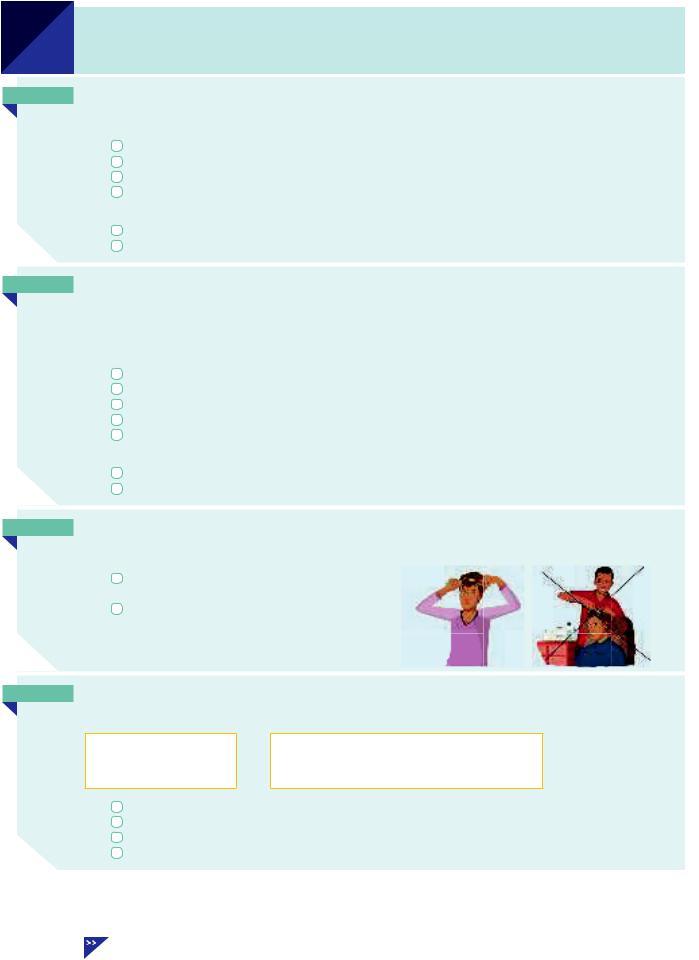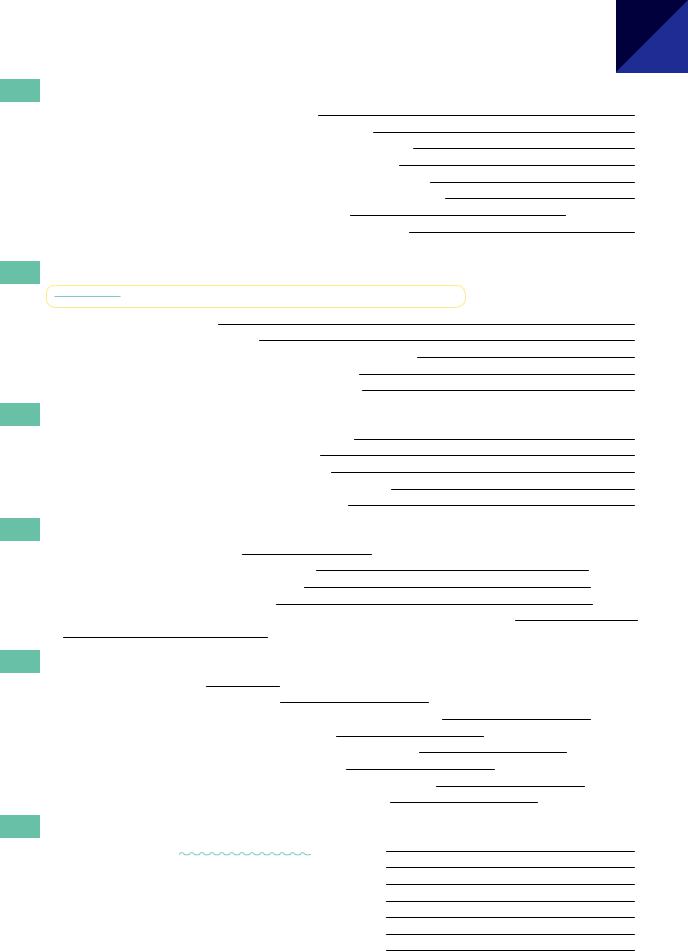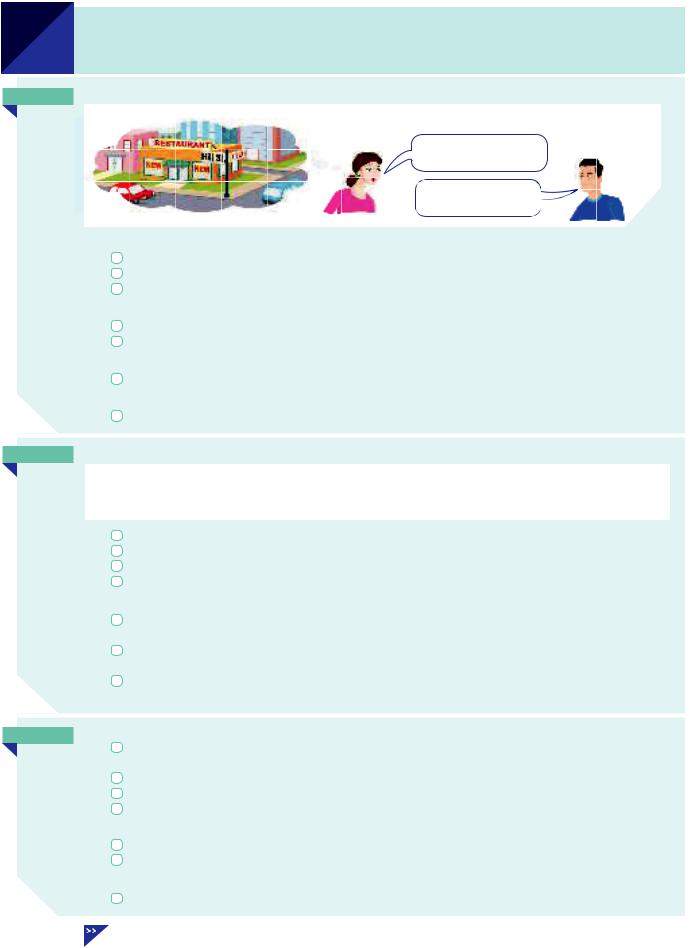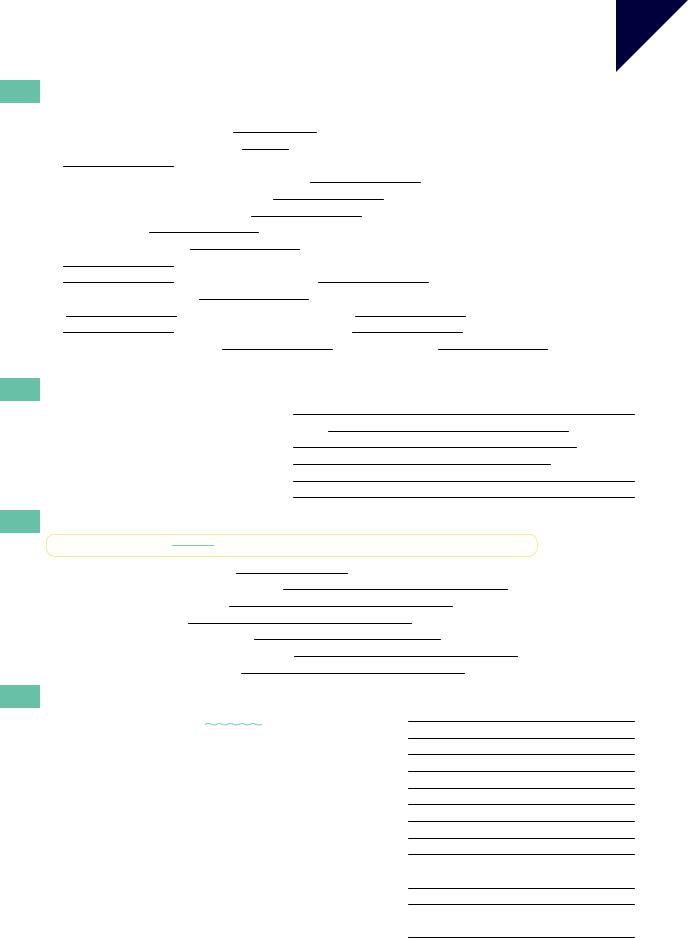
- •Contents
- •Thanks
- •To the student
- •To the teacher
- •3 Present continuous and present simple 1 (I am doing and I do)
- •10 Present perfect continuous and simple (I have been doing and I have done)
- •11 how long have you (been) … ?
- •12 for and since when … ? and how long … ?
- •13 Present perfect and past 1 (I have done and I did)
- •14 Present perfect and past 2 (I have done and I did)
- •15 Past perfect (I had done)
- •16 Past perfect continuous (I had been doing)
- •17 have and have got
- •18 used to (do)
- •19 Present tenses (I am doing / I do) for the future
- •20 I’m going to (do)
- •21 will and shall 1
- •22 will and shall 2
- •23 I will and I’m going to
- •24 will be doing and will have done
- •26 can, could and (be) able to
- •27 could (do) and could have (done)
- •28 must and can’t
- •29 may and might 1
- •30 may and might 2
- •31 have to and must
- •32 must mustn’t needn’t
- •33 should 1
- •34 should 2
- •35 I’d better … it’s time …
- •36 would
- •39 if I knew … I wish I knew …
- •40 if I had known … I wish I had known …
- •41 wish
- •42 Passive 1 (is done / was done)
- •43 Passive 2 (be done / been done / being done)
- •44 Passive 3
- •45 it is said that … he is said to … he is supposed to …
- •46 have something done
- •47 Reported speech 1 (he said that …)
- •48 Reported speech 2
- •49 Questions 1
- •52 Question tags (do you? isn’t it? etc.)
- •53 Verb + -ing (enjoy doing / stop doing etc.)
- •54 Verb + to … (decide to … / forget to … etc.)
- •55 Verb (+ object) + to … (I want you to …)
- •56 Verb + -ing or to … 1 (remember, regret etc.)
- •57 Verb + -ing or to … 2 (try, need, help)
- •58 Verb + -ing or to … 3 (like / would like etc.)
- •59 prefer and would rather
- •60 Preposition (in/for/about etc.) + -ing
- •61 be/get used to … (I’m used to …)
- •63 there’s no point in -ing, it’s worth -ing etc.
- •64 to … , for … and so that …
- •65 Adjective + to …
- •66 to … (afraid to do) and preposition + -ing (afraid of -ing)
- •67 see somebody do and see somebody doing
- •68 -ing clauses (He hurt his knee playing football.)
- •69 Countable and uncountable 1
- •70 Countable and uncountable 2
- •71 Countable nouns with a/an and some
- •74 the 2 (school / the school etc.)
- •75 the 3 (children / the children)
- •77 Names with and without the 1
- •78 Names with and without the 2
- •79 Singular and plural
- •80 Noun + noun (a bus driver / a headache)
- •81 -’s (your sister’s name) and of … (the name of the book)
- •82 myself/yourself/themselves etc.
- •83 a friend of mine my own house on my own / by myself
- •84 there … and it …
- •85 some and any
- •87 much, many, little, few, a lot, plenty
- •90 all every whole
- •91 each and every
- •92 Relative clauses 1: clauses with who/that/which
- •94 Relative clauses 3: whose/whom/where
- •95 Relative clauses 4: extra information clauses (1)
- •96 Relative clauses 5: extra information clauses (2)
- •97 -ing and -ed clauses (the woman talking to Tom, the boy injured in the accident)
- •98 Adjectives ending in -ing and -ed (boring/bored etc.)
- •99 Adjectives: a nice new house, you look tired
- •100 Adjectives and adverbs 1 (quick/quickly)
- •102 so and such
- •104 quite, pretty, rather and fairly
- •105 Comparative 1 (cheaper, more expensive etc.)
- •106 Comparative 2 (much better / any better etc.)
- •107 Comparative 3 (as … as / than)
- •108 Superlative (the longest / the most enjoyable etc.)
- •109 Word order 1: verb + object; place and time
- •110 Word order 2: adverbs with the verb
- •111 still any more yet already
- •112 even
- •114 in case
- •116 as (as I walked … / as I was … etc.)
- •117 like and as
- •119 during for while
- •121 at/on/in (time)
- •122 on time and in time at the end and in the end
- •123 in/at/on (position) 1
- •124 in/at/on (position) 2
- •125 in/at/on (position) 3
- •126 to, at, in and into
- •127 in/on/at (other uses)
- •129 Noun + preposition (reason for, cause of etc.)
- •130 Adjective + preposition 1
- •131 Adjective + preposition 2
- •132 Verb + preposition 1 to and at
- •134 Verb + preposition 3 about and of
- •135 Verb + preposition 4 of/for/from/on
- •136 Verb + preposition 5 in/into/with/to/on
- •137 Phrasal verbs 1 Introduction
- •138 Phrasal verbs 2 in/out
- •139 Phrasal verbs 3 out
- •142 Phrasal verbs 6 up/down
- •143 Phrasal verbs 7 up (1)
- •144 Phrasal verbs 8 up (2)
- •145 Phrasal verbs 9 away/back
- •Additional exercises
- •Study guide
- •Key to Exercises
- •Key to Additional exercises (see page 302)
- •Key to Study guide
- •Index

Unit
83
A
a friend of mine my own house on my own / by myself
a friend of mine / a friend of yours etc.
We say ‘(a friend) of mine/yours/his/hers/ours/theirs’.
A friend of mine = one of my friends:
I’m going to a wedding on Saturday. A friend of mine is getting married. (not a friend of me)
We went on holiday with some friends of ours. (not some friends of us)
Harry had an argument with a neighbour of his. It was a good idea of yours to go to the cinema.
In the same way we say ‘(a friend) of my sister’s / (a friend) of Tom’s’ etc. :
That woman over there is a friend of my sister’s. (= one of my sister’s friends) It was a good idea of Tom’s to go to the cinema.
Bmy own … / your own … etc.
We say my own / your own / her own … etc. :
my own house your own car her own room (not an own house, an own car etc.)
my own … / your own … etc. = something that is only mine/yours, not shared or borrowed:
I don’t want to share a room with anybody. I want my own room.
Vicky and Gary would like to have their own house.
It’s a shame that the apartment hasn’t got its own parking space.
It’s my own fault that I have no money. I buy too many things I don’t need.
Why do you want to borrow my car? Why don’t you use your own? (= your own car)
You can also say ‘a room of my own’, ‘a house of your own’, ‘problems of his own’ etc. :
I’d like to have a room of my own.
He won’t be able to help you with your problems. He has too many problems of his own.
CHe cuts his own hair
We also use own to say that we do something ourselves instead of somebody else doing it for us. For example:
Paul usually cuts his own hair. |
|
|
(= he cuts it himself) |
|
|
I’d like to have a garden so that |
|
|
I could grow my own vegetables. |
PaUL |
|
(= grow them myself instead of |
||
|
||
buying them from shops) |
|
Don my own / by myself
On my own and by myself both mean ‘alone’. So you can say:
on
⎪ ⎬ ⎪ ⎭
my / your his / her / its our / their
own
or
by
⎪ ⎬ ⎪ ⎭
myself / yourself (singular) himself / herself / itself
ourselves / yourselves (plural) / themselves
I like living on my own. or I like living by myself.
Some people prefer to live on their own. or … live by themselves.
Jack was sitting on his own in a corner of the cafe. or Jack was sitting by himself … Did you go on holiday on your own? or Did you go on holiday by yourself?
166 |
myself/yourself/themselves etc. Unit 82 |

Exercises
83.1 Change the underlined words and use the structure … of mine/yours etc.
1 I’m meeting one of my friends tonight.
2 We met one of your relatives.
3 Jason borrowed one of my books. 4 I met Lisa and some of her friends.
5 We had dinner with one of our neighbours. 6 I went on holiday with two of my friends. 7 I met one of Amy’s friends at the party.
8It’s always been one of my ambitions to travel round the world.
I’m meeting a friend of mine tonight.
We met a Jason borrowed I met Lisa and
We had dinner with
I went on holiday with I met
It’s always been
to travel round the world.
Unit
83
at the party.
83.2 Complete the sentences using my own / our own etc. + the following:
|
bathroom |
business |
opinions |
private beach |
words |
1 |
I share a kitchen, but I have |
my own bathroom |
. |
||
2 |
Gary doesn’t think like me. He has |
|
. |
||
3 |
Julia doesn’t want to work for other people. She wants to start |
. |
|||
4 |
In the test we had to read a story, and then write it in |
. |
|||
5 |
We stayed at a luxury hotel by the sea. The hotel had |
. |
|||
83.3 Complete the sentences using my own / your own etc.
1 |
Why do you need to borrow my car? Why don’t you use your own car |
? |
2 |
How can you blame me? It’s not my fault. It’s |
. |
3 |
She’s always using my ideas. Why can’t she use |
? |
4 |
Please don’t worry about my problems. I’m sure you have |
. |
5 |
I can’t make his decisions for him. He has to make |
. |
83.4 Complete the sentences using my own / your own etc. Use the verbs in brackets.
1 |
Paul never goes to a barber. He cuts his own hair |
. (cut) |
2 |
Helen doesn’t oten buy clothes. She likes to |
. (make) |
3 |
I’m not going to clean your shoes. You can |
. (clean) |
4 |
We don’t oten buy bread. We usually |
. (bake) |
5 |
Jack and Joe are singers. They sing songs written by other people, but they also |
|
.(write)
83.5Complete the sentences using my own / your own etc. or myself/yourself etc.
1 |
Did you go on holiday on your own ? |
|
|
2 |
The box was too heavy for me to lit by |
. |
|
3 |
We had no help decorating the apartment. We did it completely on |
. |
|
4 |
Very young children should not go swimming by |
. |
|
5 |
‘Who was Tom with when you saw him?’ |
‘Nobody. He was by |
.’ |
6 |
I don’t like strawberries with cream. I like them on |
. |
|
7 |
Do you like working with other people or do you prefer working by |
? |
|
8 |
I went out with Sally because she didn’t want to go out on |
. |
|
83.6 Are these sentences OK? Correct them where necessary.
1 |
Katherine would like to have the own house. |
... to have her own house. |
2 |
Sam and Chris are colleagues of me. |
|
3 |
I was scared. I didn’t want to go out by my own. |
|
4 |
In my last job I had own ofice. |
|
5 |
He must be lonely. He’s always with himself. |
|
6 |
My parents have gone away with some friends of them. |
|
7 |
Are there any countries that produce all own food? |
|
167

Unit
84 there … and it …
AStudy this example:
There’s a new restaurant in Hill Street.
Yes, I know. I’ve heard it’s very good.
We use there … when we talk about something for the first time, to say that it exists:
There’s a new restaurant in Hill Street.
I’m sorry I’m late. There was a lot of traf ic. (not It was a lot of traf ic)
Things are very expensive now. There has been a big rise in the cost of living.
It = a specific thing, place, fact, situation etc. :
We went to the new restaurant. It’s very good. (It = the restaurant)
I wasn’t expecting her to call me. It was a complete surprise. (It = that she called)
Compare there and it:
I like this town. There’s a lot to do here. It’s an interesting place.
There also means ‘to/at/in that place’:
The house is unoccupied. There’s nobody living there. (= in the house)
B You can say:
there will be |
there must have been |
there is sure to be |
there is likely to be |
there must be |
there should have been |
there is bound to be |
there is supposed to be |
there might be etc. |
there would have been etc. |
there is going to be |
there used to be |
|
|
|
|
‘Is there a flight to Rome tonight?’ ‘There might be. I’ll check online.’ If people drove more carefully, there wouldn’t be so many accidents.
I could hear music coming from the house. There must have been somebody at home. There’s bound to be a cafe somewhere near here. (= There’s sure to be …)
Compare there and it:
They live on a busy road. There must be a lot of noise from the traf ic.
They live on a busy road. It must be very noisy. (It = living on a busy road)
There used to be a cinema here, but it closed a few years ago.
That building is now a supermarket. It used to be a cinema. (It = that building)
There’s sure to be a flight to Rome tonight.
There’s a flight to Rome tonight, but it’s sure to be full. (it = the flight)
CWe say:
It’s dangerous to walk in the road. (not To walk in the road is dangerous)
Normally we use It … at the beginning of sentences like this. Some more examples:
It didn’t take us long to get here.
It’s a shame (that) you can’t come to the party.
It’s not worth waiting any longer. Let’s go.
We also use it to talk about distance, time and weather:
How far is it from here to the airport?
It’s a long time since we last saw you.
Compare it and there:
It was windy. but There was a cold wind.
|
supposed to … Unit 45B it’s worth / it’s no use / there’s no point Unit 63A |
168 |
sure to / bound to … etc. Unit 65E there is + -ing/-ed Unit 97 |

Exercises |
Unit |
84 |
|
|
|
84.1Put in there is/was or it is/was. Some sentences are questions (is there … ? / was it … ? etc.) and some are negative (there isn’t / it wasn’t etc.).
1 |
The journey took a long time. |
There was |
a lot of trafic. |
|
|
2 |
What’s the new restaurant like? |
Is it good? |
|
||
3 |
|
something wrong with the washing machine. It’s not working properly. |
|||
4 |
I wanted to visit the museum yesterday, but |
enough time. |
|||
5 |
What’s that new building over there? |
a hotel? |
|
||
6 |
How can we get across the river? |
a bridge? |
|
||
7 |
A few days ago |
|
a big storm, which caused a lot of damage. |
||
8 |
I can’t find my phone. |
in my bag – I just looked. |
|||
9 |
|
anything interesting on TV, so I turned it of. |
|
||
10 |
|
oten very cold here, but |
|
much snow. |
|
11 |
I couldn’t see anything. |
completely dark. |
|
||
12 |
‘ |
a bookshop near here?’ |
‘Yes, |
one in Hudson Street.’ |
|
13 |
|
dificult to get a job right now. |
a lot of unemployment. |
||
14 |
When we got to the cinema, |
|
a queue outside. |
a very long |
|
|
queue, so we decided not to wait. |
|
|
||
84.2 Read the first sentence and then write a sentence beginning There … .
1 The roads were busy yesterday.
2 This soup is very salty.
3 The box was empty.
4 About 50 people came to the meeting.
5 The film is very violent.
There was a lot of traffic.
There |
in the soup. |
|
in the box. |
|
at the meeting. |
6 I like this town – it’s lively.
84.3Complete the sentences. Use there would be, there used to be etc. Choose from:
|
won’t |
may |
would |
wouldn’t |
should |
used to |
is going to |
|
1 |
If people drove more carefully, |
there would be |
fewer accidents. |
|
||||
2 |
‘Do we have any eggs?’ ‘I’m not sure. |
|
|
|
some in the fridge.’ |
|||
3 |
I think everything will be OK. |
|
|
|
|
any problems. |
||
4 |
Look at those clouds. |
|
|
|
a storm. I’m sure of it. |
|||
5 |
There isn’t a school in the village. |
|
|
|
one, but it closed a few years ago. |
|||
6 |
People drive too fast on this road. I think |
|
|
|
a speed limit. |
|||
7 |
If people weren’t so aggressive, |
|
|
|
|
any wars. |
||
84.4Are these sentences OK? Change it to there where necessary.
1 They live on a busy road. It must be a lot of noise.
2 It’s a long way from my house to the nearest shop.
3 Ater the lecture it will be an opportunity to ask questions. 4 Why was she so unfriendly? It must have been a reason. 5 I like where I live, but it would be nicer to live by the sea. 6 How long is it since you last went to the theatre?
7 It used to be a lot of tourists here, but not many come now. 8 My phone won’t work here. It’s no signal.
9 It was Ken’s birthday yesterday. We had a party.
10We won’t have any problem parking the car. It’s sure to be a car park somewhere.
11I’m sorry about what happened. It was my fault.
12I was told that it would be somebody to meet me at the station, but it wasn’t anybody.
There must be a lot of noise. OK
169
